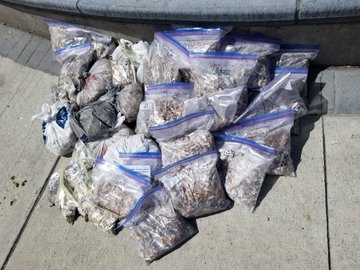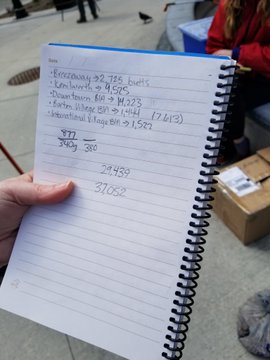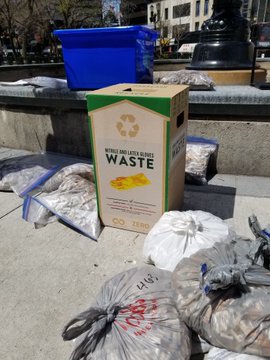World’s most littered item now recyclable in Vermont
Montpelier, Vermont – TerraCycle, the world’s leader in the collection and repurposing of complex waste streams, has joined forces with Central Vermont Solid Waste Management District (CVSWMD) and local community organizations to recycle the world’s most littered item – cigarette butts. After being shipped to TerraCycle, the waste collected through the program is processed into plastic pellets for use in a variety of recycled products while the remaining tobacco is composted.
“Although we don’t want to encourage smoking, cigarettes aren’t going away anytime soon and when possible it’s part of our mission to keep materials out of the landfill and send them to outlets to recapture as many embedded resources as possible,” said Charlotte Low, former operations manager for CVSWMD. “Our program really gained steam when a group dubbed the “Trash Tramps”, a group of Monteplier senior citizens, volunteered to pick-up littered butts throughout the city and applied for a CVSWMD grant to place cigarette receptacles in highly-traveled areas, as well.”
On average, The Trash Tramps’ volunteers collect about 5 gallons of cigarette butts every two weeks, which translates to a significant amount of waste being diverted from sidewalks, parks, landfills, or even our shared waterways.
Through this program, CVSWMD is not only addressing the nation’s most commonly littered item but also a form of potentially harmful plastic waste. Since implementing the program, six cigarette collection receptacles have been placed near exceptionally busy street-corners, benches and parking lots throughout Montpelier. CVSWMD also provided grant funding to the Union Agricultural Society to purchase three cigarette butlers located throughout the Turnbridge fairgrounds.
Participating in TerraCycle’s Cigarette Recycling Program is CVSWMD’s latest effort to grow their socially-responsible, environmental initiatives. In addition to introducing cigarette recycling, CVSWMD’s works to set a sustainable-example for the community through operation of the Additional Recyclables Collection Center (ARCC) in Barre City where nearly 40 hard-to-recycle materials, including shoes, pellet bags, and waste from various TerraCycle brand-sponsored collection programs are aggregated.
All of the collected waste collected through the Cigarette Recycling Program is shipped to TerraCycle for recycling. When processed, the paper and tobacco is separated from the filter and composted. The filter is recycled into plastic pellets which can be used by manufacturers to make a number of products such as shipping pallets, ashtrays and park benches.
“These receptacles will help keep Montpelier free of one of the most littered items on the planet,” said Tom Szaky, the founder and CEO of TerraCycle. “With this program, Central Vermont Solid Waste Management District is taking a step to reduce the amount of trash going to landfill while also preserving the area’s natural beauty.”
TerraCycle has collected hundreds of millions of cigarette butts globally. Additionally, through its various recycling programs, it has engaged over 200 million people across 21 countries to collect and recycle more than eight billion pieces of waste that were otherwise non-recyclable.

 A three-hour single-day clean up event has rid Hamilton of tens of thousands of cigarette butts in the city’s downtown core.
Saturday’s ‘Butt Blitz’ was an affair tied to a prevention program launched this past week, aimed at reducing cigarette litter across the city.
A three-hour single-day clean up event has rid Hamilton of tens of thousands of cigarette butts in the city’s downtown core.
Saturday’s ‘Butt Blitz’ was an affair tied to a prevention program launched this past week, aimed at reducing cigarette litter across the city.





 Styrofoam, broken glass, food wrappers, coffee cups, beverage bottles and cans as well as pieces of clothing and unidentified plastic made up most of the trash. Large items like eavestroughing, a plastic chair and a piece of a toilet were carried back to the dumpster (thank you Miller Waste) on a bike trailer (thanks
Styrofoam, broken glass, food wrappers, coffee cups, beverage bottles and cans as well as pieces of clothing and unidentified plastic made up most of the trash. Large items like eavestroughing, a plastic chair and a piece of a toilet were carried back to the dumpster (thank you Miller Waste) on a bike trailer (thanks  he Owen Sound Farmers' Market, selling reusable and low-waste items from produce bags to bamboo cutlery and toothbrushes, and speaking to local residents about small changes that can have a big impact on our waste stream.
Saturday's pick-up coordinator, St. Mary’s Grade 12 student Meredith MacFarlane was encouraged by the efforts of the group. “It was a pretty wet day, but that motivated us to get the trash off the ground before it can make its way into our harbour. I just wish everyone would realize they are contributing to the decline in water quality and marine life when they casually toss a cigarette butt, candy wrapper or plastic coffee lid on the ground.”
Meredith and Owen Sound Waste Watcher Facilitator Laura Wood hope to present the findings of the day to Owen Sound City Council within a month and urge immediate action to reduce single-use plastic and improve awareness of the problem.
“Our planet has limited resources and we need to learn how to use these resources wisely. We look forward to more events like this in the days ahead,” says Wood.
he Owen Sound Farmers' Market, selling reusable and low-waste items from produce bags to bamboo cutlery and toothbrushes, and speaking to local residents about small changes that can have a big impact on our waste stream.
Saturday's pick-up coordinator, St. Mary’s Grade 12 student Meredith MacFarlane was encouraged by the efforts of the group. “It was a pretty wet day, but that motivated us to get the trash off the ground before it can make its way into our harbour. I just wish everyone would realize they are contributing to the decline in water quality and marine life when they casually toss a cigarette butt, candy wrapper or plastic coffee lid on the ground.”
Meredith and Owen Sound Waste Watcher Facilitator Laura Wood hope to present the findings of the day to Owen Sound City Council within a month and urge immediate action to reduce single-use plastic and improve awareness of the problem.
“Our planet has limited resources and we need to learn how to use these resources wisely. We look forward to more events like this in the days ahead,” says Wood.
 A Beamsville-based group of volunteers united by their goal to decrease Niagara’s environmental footprint is asking for the public’s help.
The Eco-Defenders are hosting Lincoln’s annual Butt Blitz on Saturday, April 27, where participants will spend roughly four hours picking up cigarette butts.
Last year’s blitz collected over 17,000 butts from Grimsby and Lincoln alone, and over 239,000 from across Canada.
New this year, the group is unveiling the Mayors’ Biggest Butts Competition, where the mayor of the municipality with the most butts collected will win a trophy.
“It is our intention that this could become an annual competition and the trophy would get passed around to the winners,” co-ordinator Jane Gadsby said in her letter to the mayors.
Every littered butt retrieved will be sent to TerraCycle, where it will be turned into plastic and used to make products like shipping pallets. Tobacco will also be separated and sent out to be composted.
Anybody wishing to support the effort can do so by notifying the group in advance of especially littered areas, can volunteer to join the cleanup or can donate prizes for volunteers of all ages.
Lincoln Butt Blitz volunteers will meet at the Fleming Centre, in Beamsville, at 10 a.m. and will clean until roughly 2 p.m. For more information, visit the groups
A Beamsville-based group of volunteers united by their goal to decrease Niagara’s environmental footprint is asking for the public’s help.
The Eco-Defenders are hosting Lincoln’s annual Butt Blitz on Saturday, April 27, where participants will spend roughly four hours picking up cigarette butts.
Last year’s blitz collected over 17,000 butts from Grimsby and Lincoln alone, and over 239,000 from across Canada.
New this year, the group is unveiling the Mayors’ Biggest Butts Competition, where the mayor of the municipality with the most butts collected will win a trophy.
“It is our intention that this could become an annual competition and the trophy would get passed around to the winners,” co-ordinator Jane Gadsby said in her letter to the mayors.
Every littered butt retrieved will be sent to TerraCycle, where it will be turned into plastic and used to make products like shipping pallets. Tobacco will also be separated and sent out to be composted.
Anybody wishing to support the effort can do so by notifying the group in advance of especially littered areas, can volunteer to join the cleanup or can donate prizes for volunteers of all ages.
Lincoln Butt Blitz volunteers will meet at the Fleming Centre, in Beamsville, at 10 a.m. and will clean until roughly 2 p.m. For more information, visit the groups